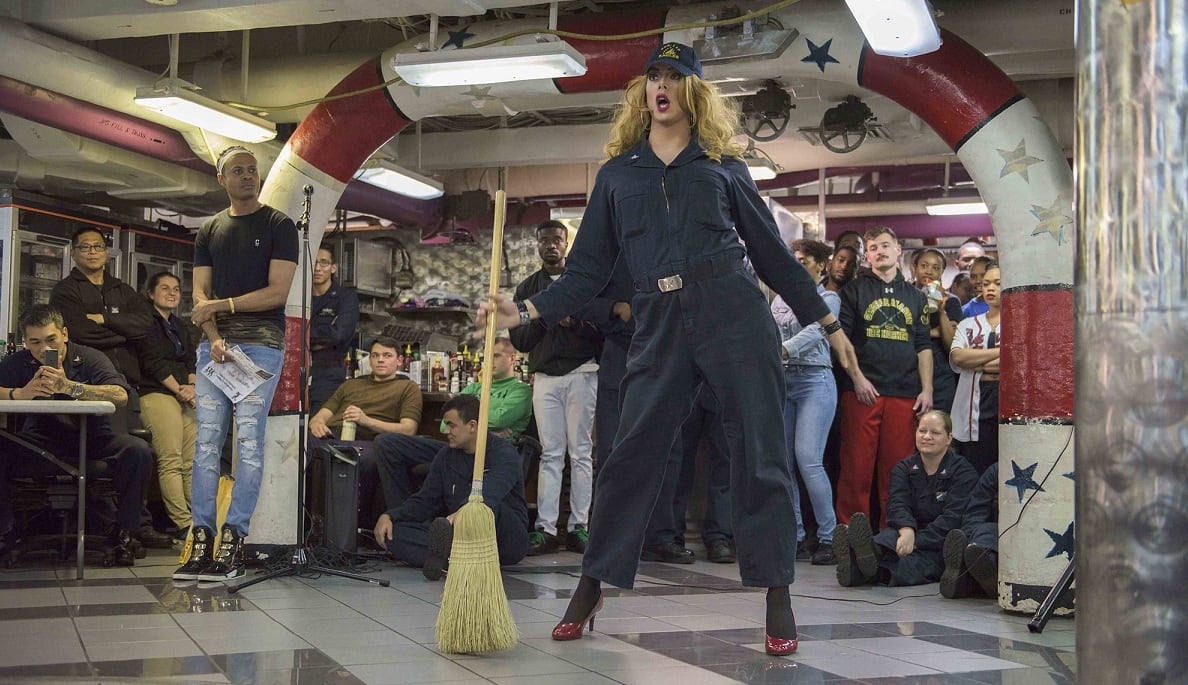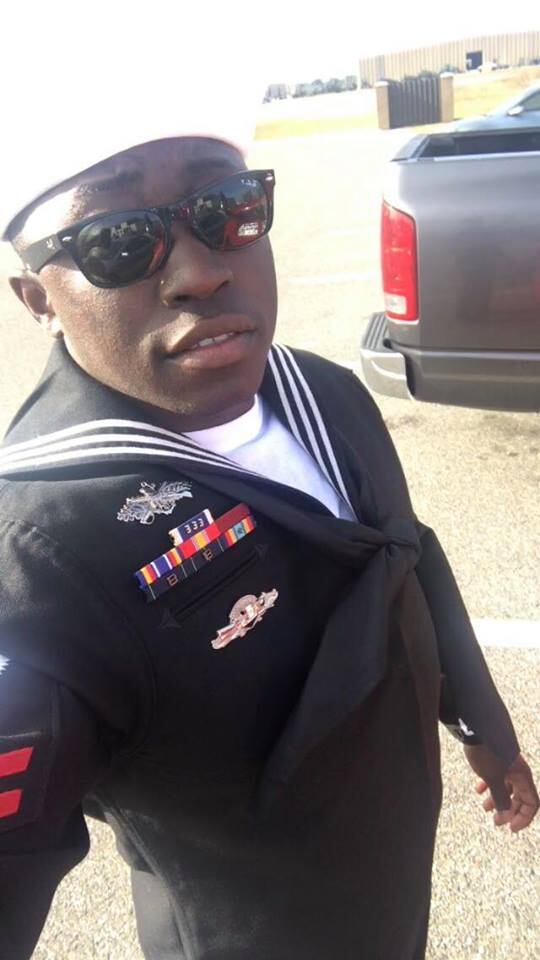Wes Phills maintained a statuesque pose alongside seven other competitors as the audience kept their eyes glued to the stage, a spotlight’s glow reflecting the coats of tanning spray each competitor donned while the judges read off the winning names of the 2018 International Association of Trans Bodybuilders competition.
“Overall Winner: Wes Phills.”
Moments earlier, Phills, a 28-year-old active-duty Seabee, was strutting across stage, striking poses and flexing as part of a competitive routine while Beyonce’s “Mine” featuring Drake blared through the speakers of the Atlanta auditorium.
The sailor had never participated in a competition like the Oct. 6 event before, one in which competitors are judged in weight class according to body mass, proportion, definition, symmetry and stage presence. It was all new, much like the past seven years of Phills' life.
RELATED

Born Pretrena Phills in Brooklyn, New York, to a Trinidadian family of eight, the construction electrician 2nd class knew that life was destined to go in a different direction.
“I always knew I wanted to transition ever since I was 21 years old, when I first found out what it was," Phills told Navy Times. "I knew I wasn’t just gay. I knew there was more to it. There was something different about me and how I felt. And when I first learned about what being transgender was, everything in my own life just started to click.”
When the Navy lifted the ban on transgender service members in 2016, Phills decided to make the transition, a process he began in 2017 and hopes to finish in “another year to 18 months,” he said. “I was told it was supposed to take about 18 months from start to finish, with at least three surgeries needed, but my process was stopped since I left on a deployment."
Other factors, like where Phills was stationed, further complicated the transitioning procedure.
After being based out of Naval Construction Battalion Center in Gulfport, Mississippi, Phills was sent to Naval Expeditionary Medical Support Command in Williamsburg, Virginia, a base he says “has much better access to medical resources or supplies needed for transitioning" than Gulfport, which had virtually none.
Throughout it all, the one area of Phills' life that has remained a constant is the five-year sailor’s ferocious regimen in the gym. That’s where Phills says he can block out the stresses of daily life and find the simplicity of iron, sweat and muscle.

“When I’m in the gym, I feel like I don’t have to worry about anything,” Phills said. “No one is there to pass any judgment — everyone is just focused on keeping themselves in the best shape possible.”
Judgment was an inevitable product of Phills' decision to transition, he said, and that can come in a variety of painful forms — from family, friends, the Navy.
“At my last command, people knew me as a she,” Phills said. “So, when that process began — when I started transitioning — there were definitely some people who didn’t get it, some who were ignorant to anything related to the transgender community. So, I became pretty isolated from them.”
Despite the isolation from what Phills calls a select few, he insists the majority of his command and friends remained supportive, both before and after the life-changing decision.
“And as far as family, they still don’t necessarily understand the concept, but for the most part, my dad, my brothers and my sisters have given me a ton of support with every personal decision I’ve made. They love me regardless.”
Unfortunately, that support has not yet been extended from his mother, who Phills said never supported his sexual preferences to begin with.
“We’re not talking,” he said, trailing off, before adding, “My support network has been critical.”
That network helps not only with the ongoing mental and physical strain endured through the transition process, but the additional burden of an already-demanding lifestyle as a sailor, Phills said.
“I’ve been emotionally drained by the process and I do get depressed at times," he said. “It’s easy to get down and wonder, ‘When is this process finally going to end? When can I just move on with my military career?’"
Phills' military career has been a stellar one, and was extended last year when he re-enlisted. Just years before, however, a policy intolerant of people like him left Phills convinced that his Navy days were coming to an end. That policy, like Phills' intent to re-enlist, was flipped when the ban lifted.
Less than a year after re-enlisting, Phills dominated the competition at the 2018 International Association of Trans Bodybuilders. In addition to taking home the overall prize, he also earned first place in his weight class — no surprise when seeing Phills' physique, the meticulously crafted results of spending a minimum of five days a week throwing iron around.
An active lifestyle has always been a reliable outlet to manage and alleviate stress, he said, but his enthusiasm for body building didn’t really pique until he enlisted.
“I love being in the gym, just seeing the end result when I’m working toward a goal or just feeling that mental relief,” he said. “Before I was power lifting, I was still working out hard, but I wasn’t lifting heavy."
It was friends and family who first encouraged Phills to try out power lifting, “just to see what I was capable of.”
It turns out Phills is capable of a lot, both inside and outside of the gym, where many of his fellow sailors have commended his work as a construction electrician.
“I have a lot of people from my unit that support me 100 percent of the way,” he said. “And they remind me not to worry about the negative comments when they do come. People are always going to have things to say — good or bad.”

That sort of camaraderie has Phills considering making the Navy a career, but “15 years is a long ways out,” he joked, “and a lot can happen between now and then.”
A lot also might happen to the military’s transgender community, a population shrouded in uncertainty after President Donald Trump announced a change to the policy on Twitter — a declaration that left the Pentagon scrambling for clarification.
“After consultation with my Generals and military experts, please be advised that the United States Government will not accept or allow Transgender individuals to serve in any capacity in the U.S. Military,” Trump tweeted on July 26, 2017. “Our military must be focused on decisive and overwhelming victory and cannot be burdened with the tremendous medical costs and disruption that transgender in the military would entail. Thank you.”
Concerns about the president’s new policy emerged from politicians and military leaders alike.
Army Gen. Mark Milley, Air Force Gen. Robert Neller and Adm. John Richardson, the chief of naval operations, all told Sen. Kristen Gillibrand, D-N.Y., "that they have seen zero reports of issues of cohesion, discipline, morale as a result of open transgender service in their respective service branches,” she said.
Transgender military personnel, like Phills, also spoke out.
“It still upsets me, because I feel like that’s inhumane to just tell someone that, ‘Sure, you can serve, but you’re not allowed to truly be yourself,'” Phills said. “Who is being transgender really hurting? It’s so typical of people to ban something they don’t even bother trying to understand.”
Despite the uncertainty, Phills remains determined to continue developing as a leader, inside both the Navy and in the trans community.
He recently helped raise awareness while attending a convention in Richmond, Virginia, about the resources available to people considering transitioning.
Training for another body building competition is also on the agenda, he said, adding that he plans on sharing his training regimen on his YouTube channel.
No matter what the future holds, Phills said the process of completing his transition has taught him invaluable lessons.
“Stay humble, patient and positive,” he said. “When I feel down, I know there are people out there who care about me, who want what’s best for me. I just have to be patient and it’ll eventually all come together. I’m not in this alone.”
J.D. Simkins is the executive editor of Military Times and Defense News, and a Marine Corps veteran of the Iraq War.





